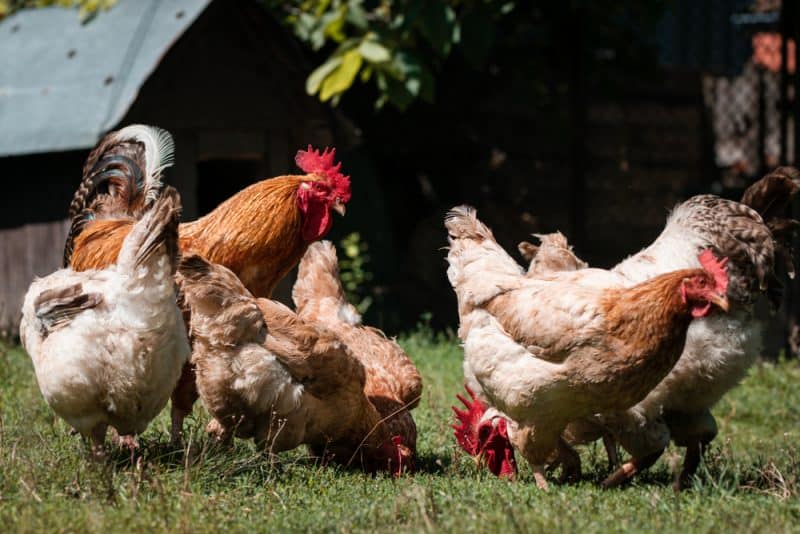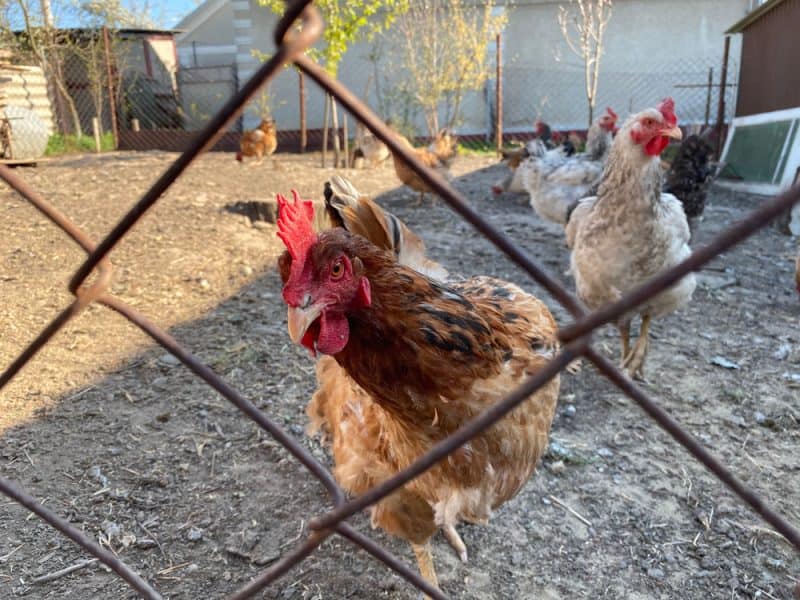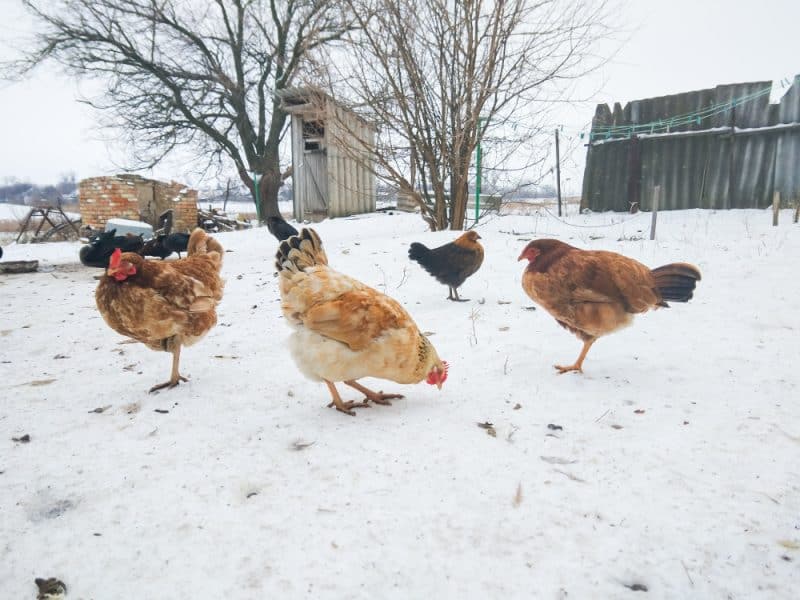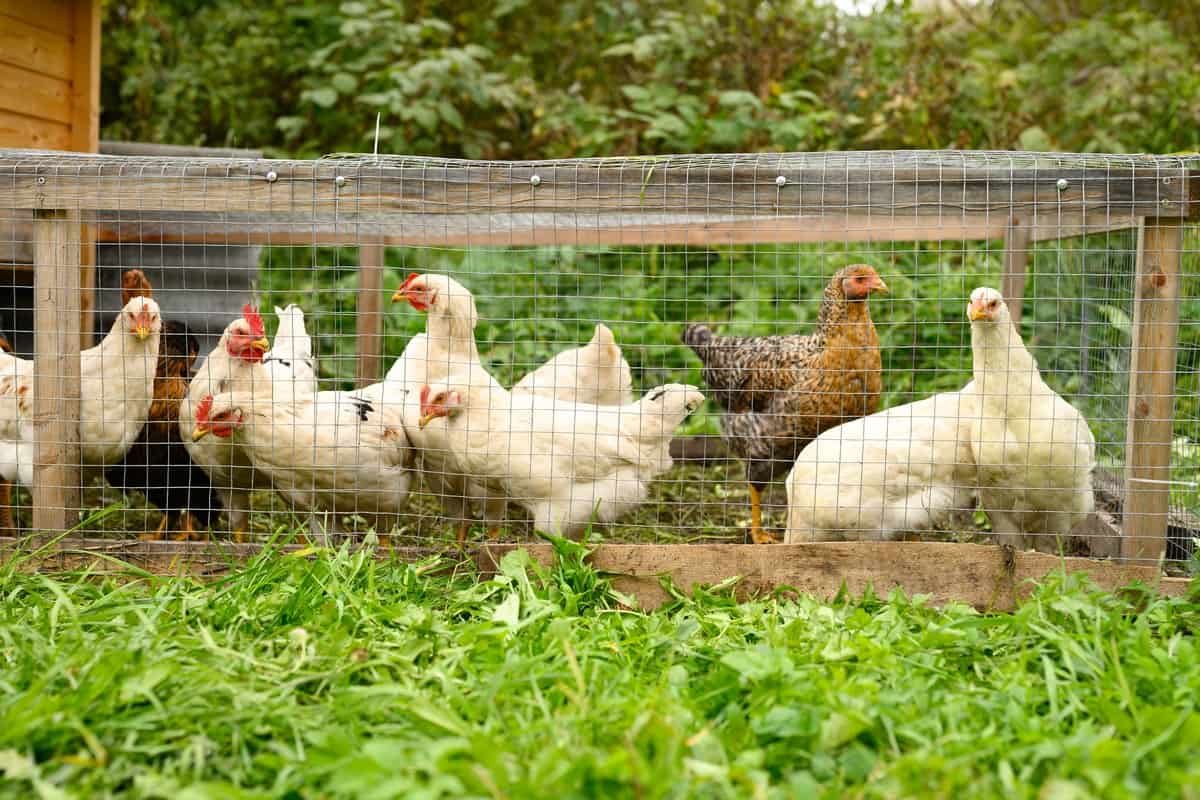Raising chickens is a great way to have fresh eggs each day, and it’s fun for the whole family. But what do you do if you don’t want to build or buy a chicken coop?
You can make your own DIY chicken coop with materials that are both easy-to-access and free – or you can forego the coop entirely.
It’s been about 4 years since we decided to go sans coop with our own flock. Now, we raise chickens primarily inside chicken tractors (though we have some birds that live inside a coop during the winter).
If you’re interested in ditching the coop – for whatever reason! – this article will let you know of alternatives you should consider.
Reasons to Ditch the Coop
Free-range chickens are rising in popularity – raising chickens in such a fashion presents many benefits in terms of both personal health and animal welfare.
However, there are other good reasons to consider raising chickens without a coop, and you don’t necessarily have to be interested in free-ranging to benefit.
The biggest disadvantage to keeping chickens “cooped up” is just that – they are being kept in a confined area and don’t have room to roam around or spread their wings. This sort of confinement can lead to many unwanted behaviors, like feather pecking and fighting.
When chickens are allowed to “do their own thing,” they can also help reduce your overall feed bill. They may be able to pick up essential nutrients and other items they need for digestion, like small rocks, as they forage about your lawn.
Of course, let’s not forget what I perceive as the biggest benefit of raising chickens without a coop – no more coop cleaning! While you will still need to keep an eye on your flock and monitor each bird for potential health issues, you can kiss goodbye days of scraping, mucking, and toiling over dirty bedding.
Ultimately, raising chickens without a coop can lead to healthier birds while also allowing you to save time and money.
Get Rid of the Chicken Coop: 6 Alternatives

Here are some alternatives to raising chickens without a coop. There are a few considerations to make for each – I’ll walk you through all aspects.
1. Free Range
Free-ranging is the first and most obvious alternative to raising chickens in a coop. Many chicken keepers do this to some extent – it’s rare to find someone who totally eschews a coop in favor of free-ranging.
There are a few problems with exclusive free-ranging – but first, the benefits. Your chickens will be able to wander where they please, allowing them to express their wildest, most “chicken-ness” selves. They can feed on whatever they’d like and will ultimately live their freest lives.
However, you will have to worry about a variety of factors – namely, chickens wandering wherever they would like. You will need to be more vigilant for predators and also make sure you aren’t close to any neighbors, where your chickens may strain your relationships.
Ideally, this technique should be avoided in exclusivity unless you have, at the very least, an acre of land on which your chickens can roam.
Keep in mind that chickens leave behind a lot of poop. If you let them free range exclusively, they’ll poop all over your lawn, your lawn furniture, your garden decor, your porch – everywhere they go. There’s also the problem of where they will sleep – something that can become increasingly problematic as winter approaches.
This is why many chicken keepers only have a partially free range, choosing to lock their chickens in at night.
2. Chicken Tractors
This is my personal favorite alternative when it comes to ditching the coop. It is a very low-cost, low-tech alternative to the coop that will allow you to have the best of both worlds in raising chickens.
A chicken tractor can be as high-tech as a coop on wheels or as low tech as a screened-in box that you slide around across the grass.
However, they all function in the same way. You move the tractor once every few days (in some cases, every day), which allows the chickens to enjoy the slugs, bugs, snails, grass, weeds, and other tasty morsels on your lawn. They’ll leave behind nitrogen-rich manure as they work.
The good thing here is that since you’re moving the tractor so often, no area ever becomes so overwhelmed with manure that it kills the plant life. It doesn’t get stinky and there’s no cleaning involved.
You can install roosts and nesting boxes in such a structure. Plus, the tractors provide protection from predators.
Of course, this might not be a year-round option, as the tractors can be impractical and difficult to move in heavy snow. That said, they’re still a good choice for the bulk of the year.
3. Fences

If you choose not to raise your chickens in any kind of coop, you must invest some extra time and money in shoring up your fences. Raising chickens without a coop makes a vulnerable animal an even easier dinner for opportunistic predators. Make sure you have tall fencing around your birds to keep predators away.
You can use portable poultry netting if you’d like. This will allow you to put your chickens wherever it’s most convenient at the time. You may also have to use metal stakes or wooden posts to secure your fencing or lay out some electrical wire as an extra preventative measure.
To prevent digging predators, you may have to bury the wire a few feet beneath the ground.
Here are more tips for deterring chicken predators.
If you decide to raise your chickens totally sans coop but still want to collect eggs, consider placing out portable laying boxes. These can be placed under an overhang or awning to provide a comfortable spot for your hens to lay eggs (and for you to find them when they’re done).
4. Three-Sided Sheds
Want to skip the coop but still be able to provide some form of protection from the elements? Consider using three-sided sheds. These structures have three walls and a roof but are typically open in the front, allowing your chickens to go in and out as they please while also providing some protection from the wind and rain.
Of course, they aren’t predator-proof, and you’ll still have some expense in building this kind of structure, but they do offer a good compromise.
5. Utilize the Porch or Deck

Do you have a covered porch or deck? This might not work for everyone, but some people may be able to provide shelter for their birds by placing some laying boxes beneath the porch. This will offer protection from the elements and since it’s so close to the house, it might also offer some predator protection.
6. Bring Them Inside?
This option is certainly not for the faint of heart – but if you raise chickens as pets, it might be a viable option.
Some chicken breeds, like Silkies, are sensitive to outdoor weather and therefore may benefit from being indoor pets. Remember, you’ll have lots of manure to contend with – but making your chicken a house pet is still an option if you are so inclined!
What to Keep in Mind

Of course, a chicken coop has tangible benefits for a flock, too. The most obvious is protection, both from the elements and from predators. A coop offers an obvious place for chickens to run to in the event of extreme cold, a driving rainstorm, or a predator attack.
Keeping chickens in a coop also helps you keep track of your flock with ease, making it easier for you to care for them and monitor their health. Coops are ideal if you are raising chickens in urban areas or have limited property – you don’t want them running off to your neighbors’ flower beds, after all.
That’s not to say that you have to keep chickens in a coop if one of these situations applies to you, though. If you consider alternatives like chicken tractors or porch “coops”, you can still keep an eye on your flock and keep them contained. It can also make it easier for you to provide necessities like food and water to your chickens and to prevent flighty birds from skipping over to the neighbor’s property.
Ultimately, having a chicken coop is a great convenience, but it can be expensive and time-consuming to maintain.
Why not try raising chickens without one?
These alternatives offer many of the same benefits as a traditional coop. They can be easier on your budget, provide shelter for your flock, and take up less space in general than an enclosed structure.
If you’ve been thinking about getting chickens but are holding back because you don’t have a coop, try one of the alternatives listed above – and if you already have a coop filled with chickens, think carefully about whether it’s truly necessary. A freer flock is waiting for you!












